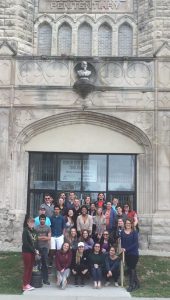Published on Oct. 21, 2016
On Oct. 2, a group of honors students toured the Missouri State Penitentiary as part of the Honors One Read Program. The trip was co-sponsored by MU Residential Life’s FIGS Program and Residence Hall Association, and was offered to students at no cost.
This year’s Honors One Read Book is Bryan Stevenson’s Just Mercy: A Story of Justice and Redemption. The book fits in with the Honors College’s yearlong focus on social justice and covers issues of unfairness and discrimination in America’s criminal justice system. One of Stevenson’s major focuses in the book is the disproportionate rate at which African American men are incarcerated compared to any other racial group.

Mizzou Honors students visit the Missouri State Penitentiary.
Incoming honors freshmen were required to read the book over the summer and attend a symposium at the beginning of the year to discuss the reading. The state penitentiary trip was offered as an optional event for honors students who wished to enhance their knowledge with a firsthand look at prison conditions.
Honors Academic Adviser Kristina Bradley and Honors Humanities Series Coordinator Rachel Harper accompanied the students on the trip. As an educator, Harper is keenly aware of the benefits that come with bringing classroom experiences to the real world.
“One of Stevenson’s main arguments in his book is that we need to get proximate. We need to get close to the people and the problems we want to solve,” Harper says. “I think it’s really easy when reading a book like Just Mercy to not think about it in terms of real people or places. I think it changes one’s experience about reading this book and thinking about prison life and culture to actually see the spaces where people were forced to live and hear some of the stories.”
The Missouri State Penitentiary, located in Jefferson City, operated from 1836 until 2004 as the state’s primary maximum-security prison. The institution is notable for housing famous inmates, such as Martin Luther King Jr.’s assassinator, James Earl Ray. Though the penitentiary is not currently operational, historical tours offer an insight into what prison life was like with a look at the different units and cells.

Touring the cells of the Missouri State Penitentiary.
A freshman honors student majoring in journalism found the cell tour particularly memorable. “Walking through the cells and seeing the conditions prisoners lived in gave me a new perspective on the prison system,” she noted. “Visiting the state penitentiary was a really unique experience.”
One of the most powerful moments of the trip came when the group walked through the execution chambers. “When you walk into that room, they have a composite on the wall of all the people who were executed in that room, and when you look at the faces, over half of them are African American. It’s hard to see those faces and wonder who didn’t have appropriate counsel, or who was innocent and still went to the chair,” Harper says.
While the main function of the trip was to reinforce the ideas and concepts students read about in “Just Mercy,” it also served to bring students in the Honors Learning Community together.
“The community building aspect among the honors students is one of the reasons we decided to add this to our One Read Program,” Bradley says. “We wanted to make it much more than just a book that they read over the summer and only talked about once. Our goal is to integrate it throughout their academic year to create a first-year honors community experience.